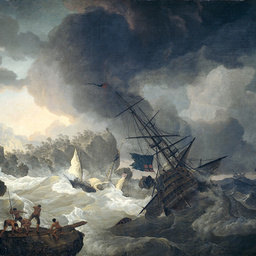|
Charlie Christenson has his music locked down. He graduated with a music degree from Lawrence University and since then his reputation and resume has increased in both volume and respect. He's survived New York, truly a modern gauntlet for any musician, where he received a Masters from the Manhattan School of Music. He's played with several talented musicians with ties to the canonical jazz artists, and now, now he's currently the Head of the Voice Department at the McNally Smith College of Music in Minnesota.
Shipwreckee, if it existed as a sight and not an album, would be the filtered rays of sunlight beating down on a coast side town on a foggy morning. The four long tracks tell two stories in one breath, about an 18th-century shipwrecked sailor and a modern-day alcoholic. They connect thematically, though the lyrics are cleverly kept ambiguous. Throughout his approximately 25 minutes, Christenson doles out heavy ruminations of loneliness, spiritual abandonment and, blessedly, rebirth. Christenson's voice itself is a melancholy baritone (least, I think it's a baritone) that compliments his delicate arrangements. Coldplay's Christ Martin would be a lazy but still fair comparison, but where Martin can sound like he’s forcing emotion, Christenson lapses right into the sadness and thickly veiled hope his subject matter requires. The music is rooted in jazz, which means a great deal of improvisation, beginning with sparse arrangements of keyboard (Christenson), drums (Matt Edlund), and trumpet (Adam Meckler), with Lizzy Herder providing vocal support with her own gentle whisper. Edlund and Meckler adroitly handle their instruments. The former effortlessly switches from skittish percussion to dynamic, energetic beats, while the latter's notes pour forth from his mouthpiece like warm syrup. Meanwhile, Christenson's spreads out his keyboard notes so as to act as checkpoints to his co-musicians' rhythms. This synergy is needed for an ensemble that most listeners are likely unfamiliar with. The first two tracks slowly build into foamy swells that flip the musical resignation the tracks begin. The title track is an excellent example, for when the seaside samples subside and Meckler appears with his farewell trumpeting and Edlund focuses his drumming into more powerful beats, the lyrics glow. "What is trust, what is love, he’s the captain who sank alone / Left to drift, life’s a bitch, he’s the captain who drank alone." Curiously, the final two tracks keep their sunnier tone more or less throughout the song. In fact, the closer, "Sunrise", ends the stories with the seaside sounds that began them, after briefly flirting with a jubilant midsection. The music is not meant to be a depressing cautionary tale but a mature look at how deeply our actions affect us. The music illustrates this point with solid compositions built on Christenson's immense patience most of us lack in this wild world. Recommended.
1 Comment
Immediately reminiscent of some ineffable blend of gospel and modern prog adepts (Beardfish first coming to mind), at least with regard to the bemused, almost sardonic sense of despair and cautious (and ultimately, false) optimism. Christenson's voice and lyrics, clever use of sample and scape (mostly via Meckler's trumpet work), and clavinet indulgence create a bubbly, proggy sound that easily merits multiple listens.
Reply
Your comment will be posted after it is approved.
Leave a Reply. |
Critique/insightWe are dedicated to informing the public about the different types of independent music that is available for your listening pleasure as well as giving the artist a professional critique from a seasoned music geek. We critique a wide variety of niche genres like experimental, IDM, electronic, ambient, shoegaze and much more.
Are you one of our faithful visitors who enjoys our website? Like us on Facebook
Archives
July 2024
|

